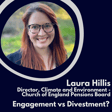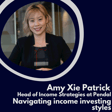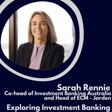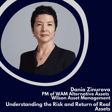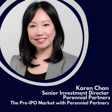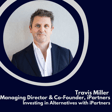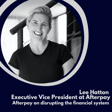Podcast Introduction
00:00:03
Speaker
Welcome back to the Alpha Females Invest podcast. Two females working in the finance industry searching for Alpha. My name is Clooney. And I'm Emily. And together we bring diversified perspectives from the buy and sell side of the finance world.
00:00:18
Speaker
As usual, any information discussed in this podcast is not financial advice. All opinions reflect those of the individuals and this podcast is for educational purposes only. You should always
Meet Anna Milne
00:00:30
Speaker
read the PDS and talk to a financial advisor who can consider your personal circumstances before you invest.
00:00:36
Speaker
Today, our speaker is Anna Milne. Originally from New Zealand, Anna joined Wilson Asset Management in 2020 and works with the WAM Leaders Team as an equity analyst. Anna has more than five years experience in financial markets and prior to joining Wilson Asset Management in 2020, Anna was a sell side equity research analyst at UBS, Credit Suisse and Jardim. If she wasn't busy enough as a financial analyst, Anna also has her CFA.
Career Challenges
00:01:05
Speaker
Welcome to the show, Anna. Thanks for having me, Emily and Clooney. Good to chat. We're super excited for this episode and we think there'll be some great little tips and tricks we uncover for all our listeners. As everyone has now got to know, we always like to kick off the podcast with the same first and last question. So if I could please ask you, what is your most embarrassing career moment? That's a tough one because
00:01:31
Speaker
There is a number of embarrassing career moments that if I were to pick one, it was about 12 months into my first full-time role at Credit Suisse. I was working the insurance and diversified financials team, and both of my bosses were away for the week. And they said to me, Anna, you can publish a report under your name for the first time. So at the time, that was quite a big deal.
00:01:56
Speaker
And it was just on a fund manager's performance, and it was something I'd run every month for the last year. So I'd done it a lot of times, basically just two lines of numbers, the fund performance, index performance, and I somehow got them round the wrong way. So I sent out, blasted to thousands of people, this note saying, performance is turned, this fund is massively underperforming.
00:02:22
Speaker
And understandably got a lot of replies that were pretty unhappy. And I got escalated to our Asia office. And to make matters worse, the company that I was writing about was a big client of ours. So no one was happy. I was extremely embarrassed and most of all disappointed that I'd absolutely wrecked my reputation from the get go.
00:02:44
Speaker
But I guess what you learn is that in hindsight, everything fades with time. So it took me a while to even remember that story. But at the time, I was absolutely devastated. It's funny at the time how I feel like, you know, some things happen. You're like, this is the worst thing that's ever happened in my life. And then five years on, you don't even remember it. Yeah. But that's a good one, especially when you feel you did it every week.
00:03:04
Speaker
Your heart just sinks when you realize that something might not be right. It's just the worst feeling in the world, but obviously hasn't affected your career to date. Absolutely nailing it now with WAM. We're so excited to talk a little bit more about your backgrounds and about what you're doing at WAM and a few of the ways you're thinking about the market.
Journey into Finance
00:03:28
Speaker
To kick off, you do have an interesting background and you've held a number of different roles on both the buy side and sell side. And I guess we'd be interested to ask you how you ended up in your current position on the buy side and your favorite aspect of working for a fund manager.
00:03:44
Speaker
Sure. So when I was in high school, I just loved accounting and economics. It came from absolutely nowhere, but my parents really fostered it. And so for my 16th birthday, they bought me some shares. And I remember receiving every six months an interim or an annual result in the mail and absolutely poring over it. I'd take it to school and ask my accounting teacher to explain things I didn't understand in the notes and all the rest.
00:04:08
Speaker
And so I always thought I'd be a chartered accountant until I went to university and realised that the world of finance and investing was so much broader than just that one aspect. And I learned about equity research and it just felt like it was the perfect intersection of everything I loved, the accounting side, current events, presentation skills, the whole package.
00:04:30
Speaker
And so I fortunately got a role at Credit Suisse in 2016, and then skipping forward a few years, went to UBS, I was in the healthcare team, and then I was actually approached by Wilson Asset Management in a very casual manner.
Role at Wilson Asset Management
00:04:45
Speaker
It was via WhatsApp, I think, from memory. And that was from my PMs, and I always knew I wanted to move to the buy side. I didn't realise it would be quite as early in my career as I thought, but
00:04:58
Speaker
Yeah, I've moved towards asset management and have just not looked back. It's been absolutely fantastic. When I think about the role, what the best part of it is, I think it's just such a privilege that every day, the aim of the day is to just learn as much as you can.
00:05:14
Speaker
It could be anything from fertilizers to milk formula to office leasing. You just learn about everything and everything that makes the world tick and then you overlay the art and the science of finance and it is just the most amazing job. But I think most importantly, it's just remembering the privilege and the responsibility that comes with managing so many other people's financial futures and that's so important.
00:05:38
Speaker
We think about that every day. Anna, I'm so impressed with your keen interest and your skills at the young age of 16. I don't think I ever picked up a copy of the AFR till I was probably applying for jobs because a family friend told me it might be a good idea to read up on the financial sector. So I love the keen interest from a young age and I think that's great and a great promotion for young people looking to get into the industry too.
00:06:03
Speaker
I guess you've obviously picked up a lot of skills along the way. From your perspective, do you think a lot of the skills that you learned from the sell side role has been quite transferable to the buy side? Absolutely.
Skill Transferability in Finance
00:06:15
Speaker
I think it is the best training ground you could possibly have. You kind of learn in bite-sized amounts and build up a really, really solid foundation of how to look at a company.
00:06:25
Speaker
And then when you move to the buy side, it is just an absolute information overload. So on the sell side, you're looking at maybe a dozen stocks and talking to all your clients. And then you move to the buy side and you're looking at hundreds of stocks and you're being advised to by hundreds of analysts and it can get pretty overwhelming. So I think having that foundation on the sell side really helps in your ability to sift through the noise and cut to what matters.
00:06:50
Speaker
So when I was on the sell side, I was really focused on the fundamental piece of the puzzle. But moving to the buy side, it's really been great to add to that and take more of a focus on the macro view and sentiment and flow and all the other aspects that come with being part of a fund. Anna, that is really cool. And as someone who's also come from the sell side to the buy side, I can definitely understand information overload. And it's quite funny when I was on the sell side, I thought,
00:07:20
Speaker
Oh, you know, everyone reads all a hundred pages of our reports. Like it's just, this is the most valuable insight they can ever get. Of course they're going to sift through every page and read every single chart and my footnotes. And then you get to the buy side and you're like, oh my God, I receive 10 of these a day. I can't read any more than the front page. And you're so right. It's being able to pick the information and thinking necessarily like picking reports that
00:07:46
Speaker
maybe don't agree with your view to work out where you could be missing something is also something that's been quite interesting. That's so true. I remember when I was sell side and would send emails to clients and they wouldn't reply. And I just, I just, why would you not have the audacity to reply to an email? And now like the number of emails I don't get around to replying to, it's absolutely shocking really.
00:08:08
Speaker
I must admit, guys, I must pipe in here and say you just can't take it personally. You just got to keep on moving. That's exactly right. Yeah, the same thing with corporate access and events. But anyway, we will move away from me. And I would love for you to tell us a little bit more about the fund that you're working for at WAM. So it is the WAM Leaders Fund, which I believe is quoted on the Stock Exchange under the code WLE. So
00:08:35
Speaker
So if you could talk us through a little bit about how that fund operates and what you do within the fund.
00:08:41
Speaker
Yeah, definitely. So yes, we're a listed investment company, WLE.asx. The Wham Leaders Fund is the Australian large cap offering at Wilson Asset Management. In the fund, we have around one and a half billion dollars funds under management on behalf of about 22,000 retail shareholders. So our shareholder base is entirely retail. And there's three of us in the team. It's the two portfolio managers, Matt Haupt and John Ayub, and then myself as equity analyst.
00:09:08
Speaker
Anna, to just broaden that a little bit more, I've heard that the WAM leaders portfolio style is quite unique among a lot of asset managers. Could you maybe just explain that top-down macroeconomic overlay that you guys place on the portfolio, and I guess explain the reasoning behind that?
WAM's Investment Process
00:09:25
Speaker
that's right. So our investment process integrates a view on the macroeconomic basis, stock specifics and sentiment and flow. So I used to think that stock price moves on earnings, balance sheet, capable management. But the reality is there are so many other factors at play. And by making a view on a stock, you're actually making inherent views on the macro environment as well.
00:09:50
Speaker
So diving into our process a little bit more, firstly the macro perspective. So we aim to identify inflection points and trends in the broader macro environment and position our portfolio before events are fully priced into the equity market. So this involves daily monitoring of live data such as commodities and FX,
00:10:10
Speaker
And then we also have regular correspondence with independent research houses that specialize in fixed income, FX, commodities, and just general central bank policy. So that's number one, that's the macro focus. Secondly is the stock specific focus, which is my main focus in my role, and to boil it down
00:10:31
Speaker
to the most simple level, it's about identifying companies that are better than the market's perception. So reality is better than perceptions. So we do this by way of talking to research analysts on the sell side, speaking to company management, speaking to people upstream and downstream of the supply chains, and just getting a really holistic view of how the company is going.
00:10:54
Speaker
And then lastly, the third attribute in our process is sentiment and flow. So we aim to execute at the best price, got to look after every single basis point and in conditions with favorable technical attributes. So every Monday morning I run stock screens looking at
00:11:12
Speaker
the share price performance over one week, one month, three months, and then looking at PEs, so PE compression, PE expansion, ranking all of them, and then EPS revisions, looking at what's been revised up, for example. So that's the earnings revisions, what's been revised up, and then maybe the share price hasn't moved, what's the reason for that. So running a lot of screens is a big part of that, and then monitoring trading flow on the investment banking desks, and then doing a lot of factor sensitivity and seasonality analysis.
00:11:41
Speaker
That is very detailed, so thank you for taking us through that. It sounds like it's a lot of work to identify stocks, but I guess that's your job. You obviously work closely with the PMs of the fund. I guess if you could share a little bit of light on how you actually construct a portfolio
00:12:00
Speaker
Clearly, you can identify stocks based on those screens that you spoke about, but how do you actually put a portfolio together? Are
Portfolio Construction Strategies
00:12:07
Speaker
you thinking about the sector allocation? Are there liquidity constraints within the portfolio on certain companies? Do you think about the weighting and the active position of the stocks?
00:12:18
Speaker
Yeah, it's a really good question and it's one we could spend a whole podcast talking about, but I'll try to summarize it. To enter a position, it has to pass through our investment process. It has to take the three boxes or at least two of them in a compelling manner. Then when you look at your portfolio, you can look at it from so many different lens. As you said, there's sector allocations.
00:12:39
Speaker
The largest sectors on the ASX are materials, banks, healthcare, consumer discretionary, and we're paid to be active, so we try not to pay too much attention to indexes, what the index weight should be.
00:12:55
Speaker
financials is 28% and we might be 24%, but that's not really a main focus. It's more about the process and the stocks that we choose to put into the portfolio as opposed to just thinking how far we are underweight or overweight.
00:13:11
Speaker
There's also a duration lens. So looking at the cash flows, are the cash flows more near dated or long dated? Because if we have a view on interest rates and yields, this will play out through those duration buckets. So companies with cash flows that are longer dated are going to be obviously more impacted when rates rise, things like that. So we look at the duration of our portfolio. There's also the value versus growth argument. WAM leaders is style agnostic, so we can do either. And we definitely
00:13:40
Speaker
kind of tilt the portfolio between the two, again, based on how we think the environment is. And then from a liquidity perspective, I mean, we're trading in the biggest stocks in the ASX, like the BHPs,
00:13:54
Speaker
and the CSLs and the COM banks, and these stocks trade hundreds of millions of dollars a day. So it's never a risk from a liquidity perspective to be fully invested. And because of that, we are less concerned about our cash holding. And if we have a kind of slightly negative view on the market, we're probably more likely to play it by going into defensives as opposed to going into cash.
00:14:19
Speaker
And then another thing when you think about the market outlook, is it positive? Is it negative? Do you have a strong view? We look at the breadth of our portfolio. So in times of uncertainty and where we don't really have a strong view, we'll spread the portfolio wide and we'll have wider breadth and be across more sectors, more positions. However, when we are fully focused on
00:14:44
Speaker
one macro aspect that we think's got a catalyst and is going to play out, we will narrow our portfolio, we'll go into offensive mode, and that's where you really kind of can generate that alpha. But there's no point in having a narrow portfolio if you don't have a really strong view. So it's about managing a lot of factors at play.
00:15:03
Speaker
but as an equity analyst I am more so on the fundamental side of things and that is more of a portfolio manager decision but we're a team of three so all decisions kind of go by all of us so it's a really great kind of team environment to be learning about all of that.
00:15:18
Speaker
Yeah, I think you've explained that investment process really well, Anna. And I think what's critical is that there are so many factors that you have to be cognizant of that really can play into portfolio construction. I guess I'm then interested to take it, I guess, another layer down and determine how do you look at the valuation within the stocks in the portfolio? You know,
00:15:40
Speaker
Is valuation a key metric? You meet some investment funds where it's all they focus on and others don't really adhere to it as much. So I'm interested as to WAM's perspective on that.
Valuation in Stock Decisions
00:15:51
Speaker
And then I guess on the other side, when looking to buy or sell stocks, do you also look at valuation on both sides of the trade there? So valuation is so important, but it can't be everything.
00:16:03
Speaker
So some stocks are cheap, but if there's no reason for them to go higher, they're always going to be cheap. You need a story. And likewise, some stocks are really expensive, but they have amazing industry tailwinds and more and more people are getting on board and momentum will send them higher. So mean reversion isn't always the case. And you can't, from our view, you can't really think about stocks entirely based on their valuation. When we're thinking about adding names into our portfolio,
00:16:32
Speaker
An easy way to do it is to decompose the share price into two parts. So you have the earnings and then you have the valuation or the price you're willing to pay for those earnings. So if the earnings profile is compelling and we see a positive story, we see earnings revisions turning upward,
00:16:52
Speaker
then that's a tick. But then it also has to have some kind of valuation aspect where there could be a rewrite. There's a catalyst. There's a good macro environment. Every single analyst has it on a cell. So there's upside if some people move to a buy, for example.
00:17:07
Speaker
So that's where you get the maximum share price upside is if both parts of a share price have upside. And if they don't both have it, then it has to be a very compelling reason. You've given some really great points about how to buy a stock or what signals you look for to buy. But given that you take a very active approach, I assume there's a lot of sell positions or sell decisions that you need to make also.
00:17:33
Speaker
And selling at the right point can be a very big driver of performance to ensure that you can sell before the stock price goes down or turns, like you said, negative earnings revisions. So how do you pick the right time to sell and what are the factors that you're looking at from the sell side versus buying a security?
00:17:54
Speaker
Yeah, deciding when to sell is often harder than deciding when to buy. And as far as return goes, as you said, your return is, you know, the price you sell it for over the price you bought it for. So that equally is important.
00:18:08
Speaker
So if a share price were to go up and your investment thesis is played out, it makes sense to reduce your position. If a share price goes up, all analysts now rate it a buy, it's at all-time highs, you'd probably think about trimming your position. If it goes up, but it's for reasons that are completely unrelated to your thesis and it's good luck and your thesis still holds, then maybe you'd continue to hold the name.
00:18:34
Speaker
What's even more difficult is the decision to sell when a stock is down. And you got to, at that point, regroup and think, does my thesis still hold or was I wrong? And if you go away and you talk to every analyst who disagrees with you, you do all the rain you can, you do industry calls, you talk to management and you still have the same view,
00:18:56
Speaker
then share price trading lower is an opportunity to buy it at a cheaper price with the hopes that it will reach your price target at some point and you'll make an even larger return. But when a share price goes down and you decide, I was wrong, which happens every day, that's not an unusual occurrence at all, we just immediately cut our losses and just get out of the position.
00:19:17
Speaker
We treat every day as a new day to reevaluate our entire portfolio and change our minds. And Matt and Johnny and my bosses often say to me, you can change your mind every single day. In fact, you can change it intraday. We don't mind. And I think in this game, as you both know, as long as you're more right than you are wrong, you're doing okay.
00:19:34
Speaker
Absolutely. And I think that point about treating every day as a new day is actually a really critical one in the investing world. You know, you often hear of people having sort of rose coloured glasses on once they fall in love with a stock, so to speak, and it becomes a market darling and you don't want to let it go. And then you hear of these sort of horrid stories where
00:19:52
Speaker
They're up 50% and then they're down 20%. I think that concept is a really great lesson for our listeners to take away. Going a little bit broader now, I'd love to know what are your views on positioning in the market at the moment? Obviously, the market recently has been quite volatile.
00:20:10
Speaker
We're seeing a lot of different headlines go around in every type of format, whether it's regulation-based, government-based, war-based, you name it. I feel like we've got a headline around it. So I'd love to understand what you think positioning looks like and where you think investors are placed at the moment.
Market Conditions and Risk Management
00:20:27
Speaker
So 2022 is definitely going to be categorized as a year of tightening. So last week, as you'd both be aware, the Fed raised interest rates for the first time post COVID. And this is two years on from when they initially announced this extraordinary monetary policy that was so geared towards getting the economy up and running. And arguably, two years on is
00:20:49
Speaker
far too late when you consider how up and running the economy has been, really. So it's now no longer a question of whether central banks are tightening, but how fast they tighten and where they stop. Overall, we think conditions for equities are going to be pretty tough going forward.
00:21:06
Speaker
Ongoing COVID uncertainty, Ukraine, Australia election aside, the three factors driving equities are risk-free rates, equity risk premiums, and growth rates. And if you think about those three factors, risk-free rates are going up, equity risk premiums probably unchanged, and growth is probably going backwards. Or not going backwards, but not growing at the rate it was of the last 12 months.
00:21:35
Speaker
But the difficulty is that nothing is linear, and along the way there will be rallies and changes in direction and sentiment, but we are so focused on protecting every single basis point of performance we have, where as plugged in as we can be to the pulse of the market to try and make money on either side of the trades.
00:21:53
Speaker
Yeah, it's a difficult market to trade in. So you guys are doing a really good job. And I think backing your calls and your research is so important because, as you said, volatility upwards, downwards. But if you believe in the story and your thesis hasn't changed, then you stick your ground. Or if it has changed, then you sell. So it's really interesting to hear how active you are. I think there's noise as well. Just ability to cut through the noise is more important than ever. You could spend all day reading
00:22:22
Speaker
AFR, SMH, Australian Wall Street Journal, and just getting so overwhelmed with everything that's going on. It is absolute 3D chess, but it's about, as you said, sticking to your views, sticking to your guns, thinking about what really matters, what the world's going to look like in 12 months time and working backwards. Yeah, absolutely.
Focus on Defensive Sectors
00:22:41
Speaker
So given that and all of your views on the market, could you maybe give a listener some insight into what the WAM leaders are holding at the moment in some of the big positions?
00:22:52
Speaker
And I guess talk through briefly just your thesis or your valuation perspective on some of those names. Sure. So in times of high volatility like we're in right now, time horizons are compressed. And as a result of this, we're quite immediate term focused. So we're looking at next week, next month, as opposed to in a year's time, in a few years' time,
00:23:17
Speaker
We're always just focused on working out what the next trend is going to be and getting ahead of that wave. So right now we're overweight defensive sectors such as healthcare and consumer staples. We've run a lot of event studies looking at previous tightening cycles and both of these sectors outperform before and after the rate hikes in a number of previous market cycles.
00:23:42
Speaker
So within healthcare, if I think back to the process I mentioned earlier, Sonic and Ram Z tick all three boxes. So Sonic Healthcare is a pathology provider and they benefited significantly during COVID from all of the COVID tests that everyone was doing all the time, basically. But now COVID is endemic and rat testing has become a lot more popular and
00:24:07
Speaker
Obviously, this earnings stream is going to run off. But sentiment has turned so negative on the name that the share price was trading below pre-COVID levels. And when you think about Sonic before COVID and you think about Sonic after COVID, the industry funding environment is a lot more favorable.
00:24:25
Speaker
there's still going to be some testing in some capacity and they have a billion dollars in the bank to spend on acquisitions. So that felt like a really no-brainer trade to us when it reached that level that it was pre-COVID. So that's been one of our positions recently.
00:24:43
Speaker
Another name is Ramsey. It's a similar story to Sonic, but the opposite really, so it's had an awful time during COVID because all of the elective surgeries have been cancelled and they've been in these government agreements to hold capacity should there be COVID surges.
00:24:58
Speaker
But now as we are normalizing and getting more used to this way of living, their earnings are undoubtedly going to go through an upgrade cycle from here. And we also think that the cost pressures are overdone by the market. And again, that was a name that was trading at the bottom of its trading range the last two years. So that was one of those ones where we saw it's getting better from here. It's trading like it's not getting any better. So that was a buy for us at that point in time.
00:25:29
Speaker
and we're still holding it now. And then if we think about the consumer staples sector, we're constructive on the supermarkets and hold both worse and coals, which is a little bit unusual for us. We'd normally pick one or the other, but we just think that really stand to benefit from a higher inflation environment. COVID costs are likely going to be easing and the market is pretty rational. So that's just a really solid, almost boring company, but boring companies aren't the worst thing in this market environment. So that's another trade we like at the moment.
00:25:59
Speaker
It seems like you've been positioned very much the right way there, just given the current market movements that I think everyone and especially Em and I have been observing.
Fund Performance and Accountability
00:26:08
Speaker
Can I ask on the back of that, what's performance of the fund been like? And is there a performance benchmark you aim to meet? And I guess for our listeners, how do you guarantee that your investors really keep you accountable?
00:26:20
Speaker
So our index is the ASX200 accumulation index. We outperform the market by 12% over one year, 11% per annum over three years and 8% per annum over five years. It has been a turbulent last few years and we think our performance is testament to our process.
00:26:38
Speaker
not being value or growth, but being able to just be absolutely flexible and able to outperform through the cycle. From our shareholders keeping us accountable, we love engaging with our shareholders. So as a listed investment company, like all the companies that we look at, we have to report our results every six months to the ASX.
00:26:58
Speaker
And then again, like the companies we look at, we choose to hold a call. So we do a live shareholder Q&A call and we sit there and talk about all the stocks and our portfolio and our outlook and answer all of their questions. And I think shareholders really like that.
00:27:13
Speaker
We have a wonderful comms team and just continuous engagement every day with our shareholders. If they have a question, someone in the investment team will pick up the phone and call them and it's really nice. The surprise almost they get when they thought they were just sending off an email and then a portfolio manager calls them and personally talks to them about Woodside or whatever it is that was on their mind. So we think that's actually a real strength of Wilson Asset Management.
00:27:40
Speaker
So our last webinar was about a fortnight ago. So if you're keen to hear more about the WAM leaders process and how we're going and everything, you can head to wilsonassetmanagement.com.au and give it a listen.
00:27:52
Speaker
Awesome. I love to hear that you're engaging with your stakeholders and I think it's so important to have that connection and shareholders to feel comfortable that you can answer their questions and we'll address it. Particularly retail investors who really do trust you with their hard-earned money.
00:28:10
Speaker
And I guess going a little bit to kind of, I guess how you and I met Anna from our banking and insurance analyst days.
Analyzing Insurance Stocks
00:28:20
Speaker
We have already spoken to a banking analyst, but I would be interested to hear a little bit more on the insurance side, given it is a sector that's thought to be quite complicated. Can you give us a little bit of an idea on how you do analyze insurance stocks and whether that would be a similar process to the banks?
00:28:39
Speaker
Of course, I remember when we met at an event or something and we both worked out, we worked in financials, faculty research, we were the only two females in the market and it was so nice. It was such a male dominated area, particularly financials. I was embarrassingly excited. I think we both were, so it's fine.
00:29:00
Speaker
So I think insurers are very different to banks, in my opinion. At a high level, general insurers collect money from their policyholders, they invest this money, and then they pay a proportion of it out in claims. So in that equation alone, there's a few factors. You have the premium rate cycle, which at the moment is really strong.
00:29:21
Speaker
You have the claims environment, which is probably a bit more mixed. And then you have bond yields, which have been a headwind for the insurers for years and are now turned. So that's a positive as well. So at a high level, we think the environment is favorable, but there is a lot more complexities to the analysis, including reinsurance agreements and vulnerability to catastrophes.
00:29:42
Speaker
Now, Anna, I'm no insurance analyst, unlike yourself and Em's little bit of experience. And I've had zero experience in that space, besides often paying for my car insurance, which seems to increase every year exponentially. So I just want to ask a bit of a left of field question, but we have some pretty recent significant flooding in both New South Wales and Queensland.
Impact of Natural Disasters on Insurance
00:30:05
Speaker
Does that have a large impact on insurance names and should investors from a top-down perspective be concerned that their catastrophe budgets are sort of large enough to withstand these types of natural disasters? Or are these really baked into people's metrics and assumptions?
00:30:22
Speaker
Yeah, it's a really good question, Clooney, and it's a very topical one as well. It was actually a discussion we had on our recent webinar plug. So, reinsurance generally caps the exposure if there is a catastrophe. So, IEG and Sun both had capped exposure, but given the recent floods and the outlook for La Nina over the coming months, they have increased their allowances slightly.
00:30:47
Speaker
But ultimately, when you turn on the TV and you see devastating footage that we've seen from Queensland and New South Wales, you can't imagine many people then decide to reduce their cover. If anything, they think, hold on, am I with a quality insurer? Am I ensuring enough? Have I paid my recent premium bill?
00:31:07
Speaker
And climate change means that insurance is more necessary than ever. But the insurers have to make money and they price risk accordingly, which is maybe why your motor's gone up every year. On a different episode, we'll come back to that. Maybe I'll ask a question offline.
00:31:26
Speaker
So, insurers price for the risk and so as risks increase, I can't see a world where insurance rates are really going to come down anytime soon. Understandably though, when there are natural disasters, the headlines look terrible and so the insurers are often hit on sentiment alone.
00:31:45
Speaker
Anna, this has been such an interesting discussion. And I think we've both learned a lot more about how WAM leaders thinks about the markets, thinks about investing and how they make investment decisions. I think that WAM is so lucky to have you on the team and definitely a value add. Goodbye on Anna from us.
00:32:06
Speaker
Likewise. We just wanted to finish the podcast the same way we finish every episode, which we would love to hear your top career tip.
Encouragement for Listeners
00:32:17
Speaker
And I guess from turning around, from sending out the wrong email to where you are now. So we'd love to hear what you think our listeners should know for their career.
00:32:27
Speaker
I would just say to always back yourself even when you're outside your comfort zone. There are so many people out there that are less capable but more confident than you, so don't let that be your one failing. I think that's great. Thanks, Anna. I think Em and I are definitely backing ourselves on this podcast. I'm not sure our knowledge is quite up to scratch, but we give it a go. I love it. It's great.
00:32:52
Speaker
We love to hear that you're backing yourself when leaders is backing themselves and we are backing you guys. So thank you so much for your time today. We've loved chatting with you and we'll definitely hopefully hear from you again soon. Thanks so much. So nice to chat. Thanks Anna.




